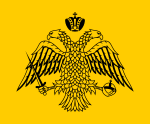Greek Orthodox Church
| Greek Orthodox Church | |
 Greek Orthodox flag and Standard of the Emperor of Byzantium |
|
| Founder | |
| Independence | |
| Recognition | |
| Primate | |
| Headquarters | |
| Territory | |
| Possessions | ( |
| Language | Koine Greek |
| Adherents | |
| Website | |
The Greek Orthodox Church (Greek: Ελληνορθόδοξη Εκκλησία, Hellēnorthódoxē Ekklēsía) is the body of several churches[1][2][3] within the larger communion of the Orthodox Church, sharing a common cultural tradition, and whose liturgy is traditionally conducted in Koine Greek,[4] the original language of the New Testament.[5]
Contents |
Churches
The churches where the Greek Orthodox term is applicable are:
- The four ancient Patriarchates:
- The Ecumenical Patriarchate of Constantinople,[6] headed by the Ecumenical Patriarch of Constantinople, who is also the "first among equals" of the Eastern Orthodox Communion
- The Greek Orthodox Church of Alexandria[9]
- The Greek Orthodox Church of Antioch[10]
- The Greek Orthodox Church of Jerusalem[11]
- Two national autocephalous churches:
- The Church of Greece[12]
- The Church of Cyprus[13][14][15]
Another autocephalous church which may be described as Greek Orthodox is the Church of Albania.[17][18][19] Led since the collapse of the former Stalinist régime by Archbishop Anastasios, a Greek national, the Church conducts its liturgy in Greek in areas populated by the ethnic Greek minority.
The Greek Orthodox Archdiocese of America should not be confused with the Orthodox Church in America, whose autocephaly – granted by the Russian Orthodox Church – is not recognized by the Ecumenical Patriarchate of Constantinople and many other churches of the Eastern Orthodox Communion.
History of the term
Historically, the term Greek Orthodox has also been used to describe all Eastern Orthodox Churches, since "Greek" in "Greek Orthodox" can refer to the Greek heritage of the Byzantine Empire.[20][21][22] During eight centuries of Christian history most major intellectual, cultural, and social developments in the Christian church took place within the Empire or in the sphere of its influence,[23][24][25] thus most parts of the liturgy, traditions, and practices of the church of Constantinople were adopted by all, and still provide the basic patterns of contemporary Orthodoxy.[26][27][28] However, the appellation "Greek" was abandoned by Slavic and other national orthodox churches in connection with their peoples' national awakenings, from as early as the 10th century A.D.[29][30][31][32][33]
See also
|
Notes
- ↑ Demetrios J. Constantelos, Understanding the Greek Orthodox Church, Holy Cross Orthodox Press 3rd edition (March 28, 2005)
- ↑ L. Rushton, Doves and magpies: village women in the Greek Orthodox Church Women's religious experience, Croom Helm, 1983
- ↑ Paul Yuzyk, The Ukrainian Greek Orthodox Church of Canada, 1918-1951, University of Ottawa Press, 1981
- ↑ Demetrios J. Constantelos, The Greek Orthodox Church: faith, history, and practice, Seabury Press, 1967
- ↑ Daniel B. Wallace: Greek Grammar Beyond the Basics: An Exegetical Syntax of the New Testament, page 12,. http://books.google.com/books?id=XlqoTVsk2wcC&printsec=frontcover&lr=#PPA12,M1. Zondervan, 1997.
- ↑ "Ecumenical Patriarchate". http://www.ec-patr.org/. Retrieved 2009-03-09.
- ↑ "Archdiocese of Thyateira and Great Britain - Home". http://www.thyateira.org.uk/. Retrieved 2009-03-11.
- ↑ "The Holy Orthodox Archdiocese of Italy and Malta". http://www.ortodossia.it/The%20Holy%20Orthodox%20Archdiocese%20of%20Italy%20ed%20Malta.htm. Retrieved 2009-03-11.
- ↑ "The official web site of Greek Orthodox Patriarchate of Alexandria and All Africa". http://www.greekorthodox-alexandria.org/index.php?lang=en. Retrieved 2009-03-09.
- ↑ "Greek Orthodox Church Of Antioch And All The East". http://www.antiochpat.org/english/sitefiles/. Retrieved 2009-03-09.
- ↑ "Jerusalem Patriarchate". http://jerusalem-patriarchate.info/en/welcome.htm. Retrieved 2009-03-09.
- ↑ "Ecclesia - The Web Site of the Church of Greece". http://www.ecclesia.gr/English/EnIndex.html. Retrieved 2009-03-09.
- ↑ "Church of Cyprus" (in Greek). http://www.churchofcyprus.org.cy/. Retrieved 2009-03-09.
- ↑ "About Cyprus - Towns and Population". Government Web Portal - Areas of Interest. Government of Cyprus. http://www.cyprus.gov.cy/portal/portal.nsf/All/817E9279C04E4480C2257023002B858C?OpenDocument. Retrieved 19 January 2010.
- ↑ "Cyprus". The World Factbook. Central Intelligence Agency. https://www.cia.gov/library/publications/the-world-factbook/geos/cy.html. Retrieved 19 January 2010.
- ↑ "The Holy Monastery of the God-trodden Mount Sinai, Saint Catherine’s Monastery". http://www.sinaimonastery.com/en/index.php?lid=1. Retrieved 2009-03-09.
- ↑ *Roudometof, Victor (2002). Collective memory, national identity, and ethnic conflict. Greenwood Press. p. 179. http://books.google.com/books?id=Xoww453NVQMC&printsec.
- ↑ Presveia (U.S.). Grapheio Typou kai Plerophorion, Published by Foto Olympic, 1995
- ↑ Assembly of Captive European Nations 1956, ACEN (Organization), 1956
- ↑ Byzantium in Encyclopedia of historians and historical writing Vol. 1, Kelly Boyd (ed.), Fitzroy Dearborn publishers, 1999 ISBN 9781884964336
- ↑ Edwin Pears, The destruction of the Greek Empire and the story of the capture of Constantinople by the Turks, Haskell House, 1968
- ↑ Millar, Fergus (2006). A Greek Roman Empire : power and belief under Theodosius II (408-450). University of California Press. p. 279 pages. ISBN 0520247035.
- ↑ Tanner, Norman P. The Councils of the Church, ISBN 0824519043
- ↑ The Byzantine legacy in the Orthodox Church by John Meyendorff - 1982
- ↑ Millar, Fergus (2006). A Greek Roman Empire : power and belief under Theodosius II (408-450). University of California Press. p. 279 pages. ISBN 0520247035.
- ↑ Hugh Wybrew, The Orthodox liturgy: the development of the eucharistic liturgy in the Byzantine rite - 1990
- ↑ The Christian Churches of the East, Vol. II: Churches Not in Communion with Rome by Donald Attwater - 1962
- ↑ J Meyendorff, Byzantine Theology: Historical Trends and Doctrinal Themes (1987)
- ↑ Joan Mervyn Hussey, The Orthodox Church in the Byzantine Empire, 1990
- ↑ A. P. Vlasto, Entry of Slavs Christendom - 1970
- ↑ Andreĭ Lazarov Pantev, Bŭlgarska istorii︠a︡ v evropeĭski kontekst - 2000
- ↑ Joan Mervyn Hussey, The Orthodox Church in the Byzantine Empire, 1990
- ↑ A. P. Vlasto, Entry of Slavs Christendom - 1970
|
|||||||||||||
